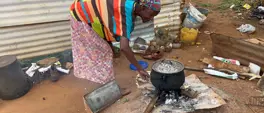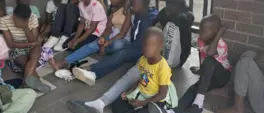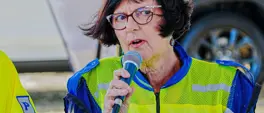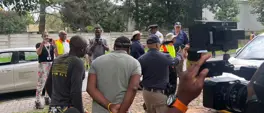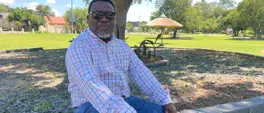Plan to use properties owned by City of Cape Town for homeless project
Marecia Damons, GroundUp
12 May 2025 | 8:58Streetscapes is fundraising to buy seven inner-city units to expand its reintegration programme.
Non-profit organisation Streetscapes is raising funds in the hope of buying seven housing units from the City of Cape Town, with plans to convert them into homes for previously homeless people.
James Vos, the City’s mayco member for economic growth, said six of the units are vacant, and three are still tenanted. He said the units were initially acquired because of plans to widen roads decades ago. Those plans have since been scrapped, and the city no longer needs them.
Vos said a sale of these properties would require council’s approval, and a public participation process. The sale could be subject to a clause in the City’s Immovable Property policy, limiting the use of the property to social care. “The policy provides for social care properties to be sold at a purchase price of between 10% to 25% of fair market value,” Vos said.
For the past decade, Streetscapes has worked to end homelessness by supporting people with jobs and houses. Their model aims to get people work. The organisation currently supports 150 formerly homeless people, through work, housing and other support.
In its peer-to-peer programmes, people who were previously homeless or struggled with addiction are trained to support others in similar situations. At Streetscapes, “peers” offer guidance and help clients with medication, housing and daily challenges.
Jesse Laitinen, Streetscapes’ founder and manager, said the new houses would be offered to peer counsellors and people who had been through the first stage of their programme and were now ready to find work and a home. They would be able to live with their families, close to the city, and pay affordable rent.
The discounted value of the properties would be R2.5 million. Streetscapes is trying to raise R250,000 through a crowdfunding campaign and is approaching businesses to fund the rest. “What we want to do is create a home in each of the units so that they won’t be a dorm or an institution,” Laitinen said.
Securing the properties would allow Streetscapes to scale up its reintegration programme for previously homeless people.
One beneficiary of that programme is Sandile Mhlongo, a former soccer player who came to Cape Town from Durban in 2002. After ending up on the streets in 2005, he moved through various shelters and programmes before finding stability with Streetscapes. He began by cleaning streets in Woodstock, then moved into one of the Streetscapes houses.
“When you’re part of the programme, they aim to put you in the house to uplift yourself,” Mhlongo said. “Housing means a lot to us because some of us never had housing before.”
Mhlongo now works as a peer supervisor. “We give people medication. If they need shelter or if they have issues, they can’t deal with alone, we intervene as peers to try to put them back on track.”
Another peer worker, Dolan Davis, spent two decades on the streets before joining Streetscapes in 2021. He began working in gardens and later moved to the organisation’s Kuils River farm. “I started setting goals for myself and changed my whole mentality,” Davis said.
Thabo Koti from Kraaifontein said Streetscapes had helped him recover from addiction and trauma. “They were the first organisation that actually walked the journey with me into recovery.” The most beneficial thing about Streetscapes housing is that it restores your dignity. You forget what home is.”
He currently works in a Streetscapes garden in Trafalgar and is a house co-ordinator at Chester House, one of Streetscapes’ properties.
“Getting those seven units would mean they’d be able to assist more people, give them hope and give them a sense of belonging and worth,” Koti said.
Jonathan Manuel from Delft was homeless at just nine-years-old after his mother died in 1995. “I was on the streets my entire life and didn’t know what it meant to sleep in a house,” he said. After getting his ID through Streetscapes, he was offered housing and work at the organisation. “Now that Streetscapes placed me in Chester House, I feel like I’m part of a family and I feel the warmth.”
The new site could also be a model for green development. “We started experimenting with this beautiful painted container, which is a laundromat. It works completely off the grid,” said Laitinen. Streetscapes plans to replicate the solar- and rainwater-powered laundromat and showers should they get the new property.
To fund construction and upgrades, Laitinen said Streetscapes is approaching solar and construction companies for cost-effective partnerships.
Asked whether there was a timeframe for the public participation process, the city said it did not have one yet as it is “still dependent on several factors”.
“The city’s Property Transactions Department is undertaking technical investigations, whereafter the public participation process will commence,” the city said. It emphasised that no final decision on a sale has been taken, and that the proposal remains under assessment ahead of the public participation phase.
While the programme’s immediate impact might seem small, Laitinen believes its symbolic value is much greater.
“If you have 100 people off the streets in one month, that’s a drop in the ocean. But it creates hope and changes the system. This is also symbolic of how we all pull together: the state gives what it has, the NGOs give what they have, and corporates come together.
“To me, it’s the model for how we can do things differently, and that is hugely exciting,” Laitinen said.
This article first appeared on GroundUp. Read the original article here.





